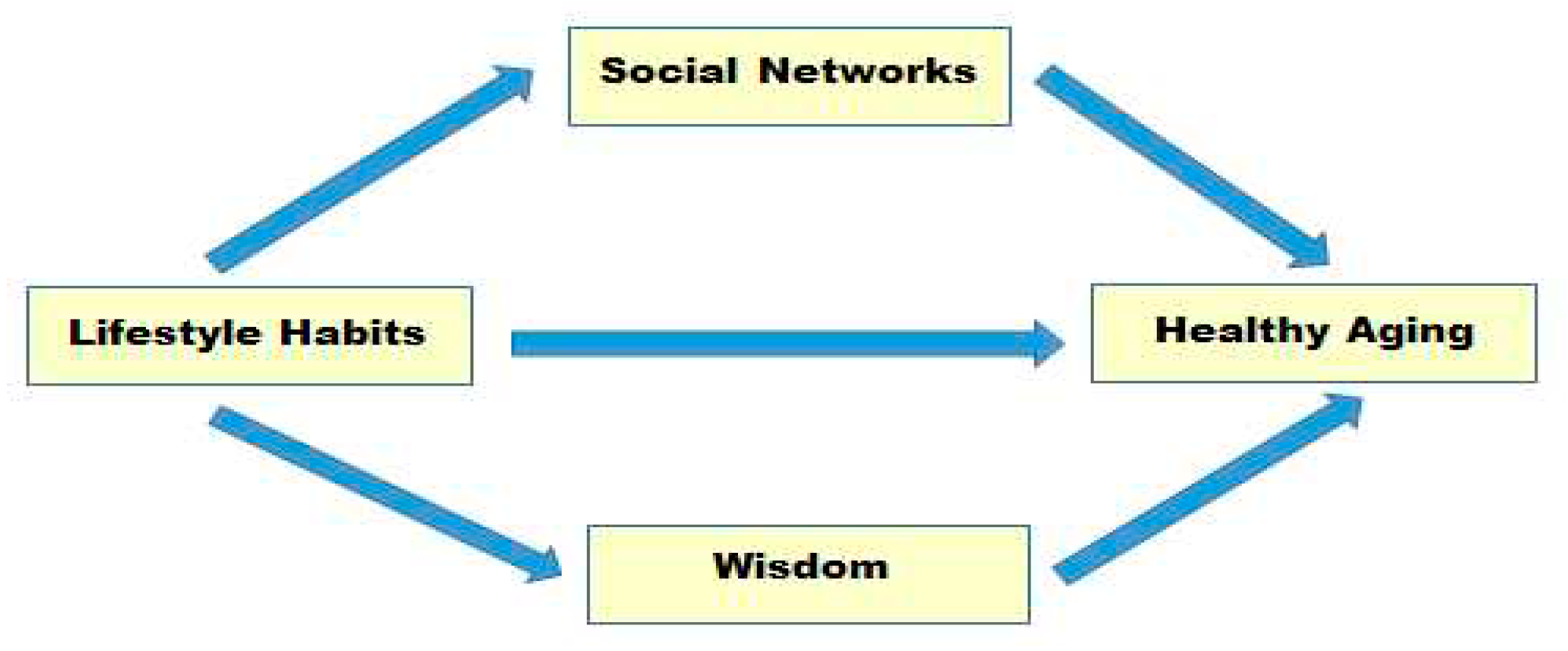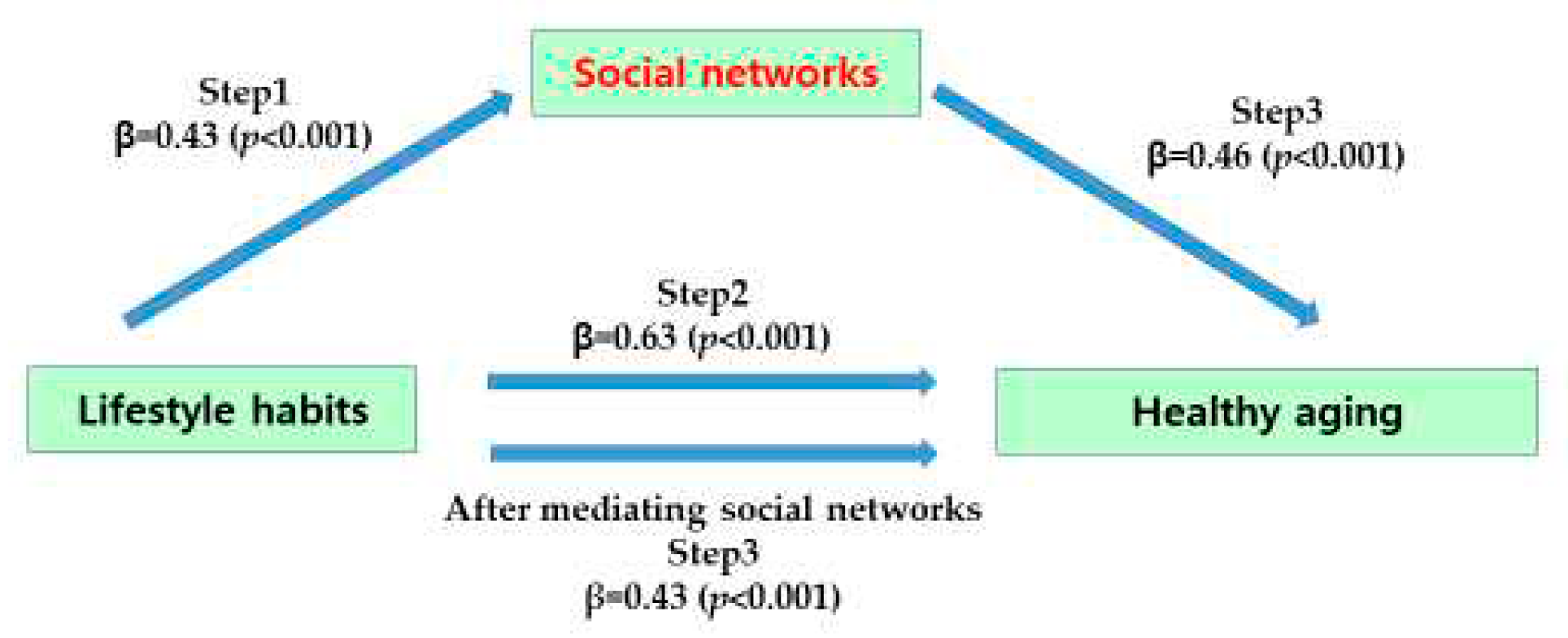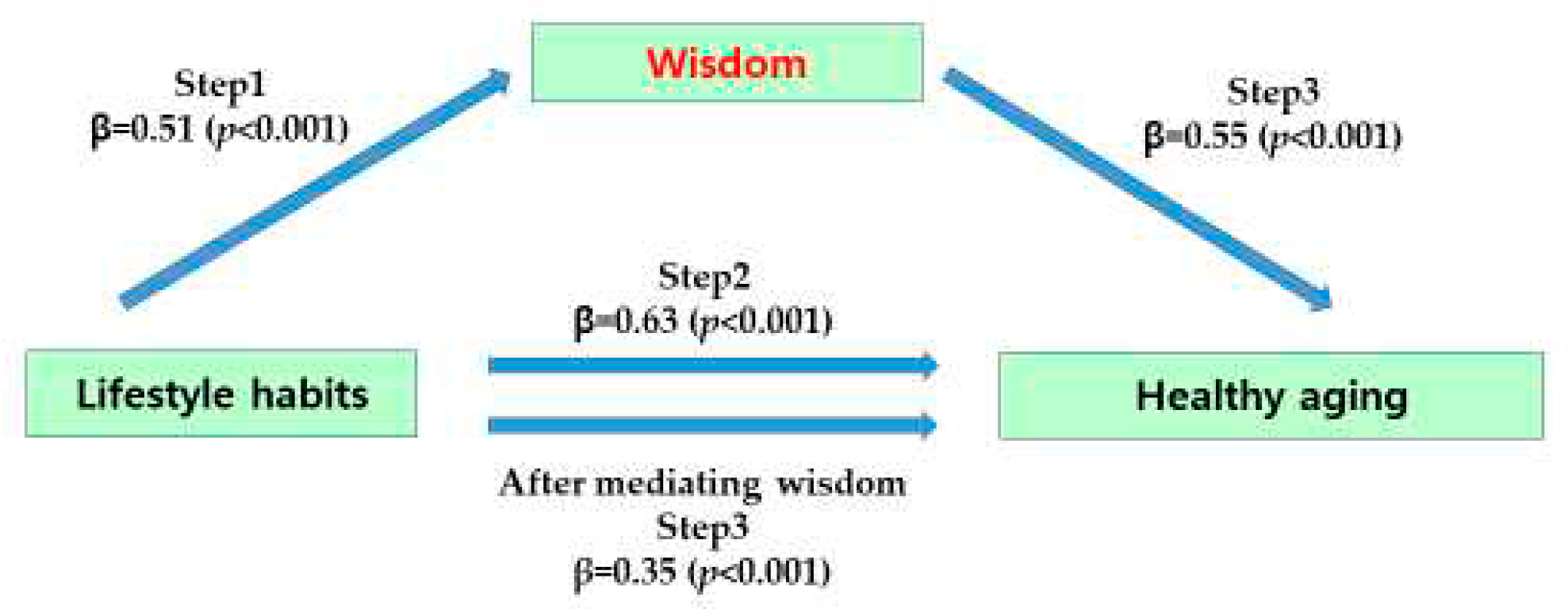Submitted:
18 July 2023
Posted:
19 July 2023
You are already at the latest version
Abstract
Keywords:
1. Introduction
2. Materials and Methods
2.1. Research Design
2.2. Participants
2.3. Procedures
2.4. Measures
2.4.1. Lifestyle Habits
2.4.2. Social Networks
2.4.3. Wisdom
2.4.4. Healthy Aging
2.5. Data Analysis
2.6. Ethical Consideration
3. Results
3.1. General Characteristics of Participants
3.2. Differences in Healthy Aging according to General Characteristics of Participants
3.3. Degree of Lifestyle Habits, Social Networks, Wisdom and Healthy Aging of Participants
3.4. Correlations between Lifestyle Habits, Social Networks, Wisdom and Healthy Aging of Participants
3.5. Mediating effect of Social networks and wisdom in the relation between Lifestyle habits and Healthy aging of Participants
3.5.1. Mediating effect of Social networks in the relation between Lifestyle habits and Healthy aging of Participants
3.5.2. Mediating effect of wisdom in the relation between Lifestyle habits and Healthy aging of Participants
4. Discussion
5. Conclusions
Author Contributions
Funding
Institutional Review Board Statement
Informed Consent Statement
Data Availability Statement
Conflicts of Interest
References
- World Health Organization. World Report on Ageing and Health; WHO Press: 1211 Geneva, Switzerland, 2015; Available online: https://apps.who.int/iris/bitstream/handle/10665/186463/9789240694811_eng.pdf?sequence=1&isAllowed=y (accessed on May 22, 2023). [Google Scholar]
- Bengtson, V. L; Rice, C. J.; Johnson, M. L. Are theories of aging important? Models and explanations in gerontology at the turn of the century. Bengtson, V. L, Schaie, K. W., Eds.; Handbook on theories of aging. Springer: New York, USA, 1999; pp. 3–20. [Google Scholar]
- Hansen-Kyle, L. A conceptual analysis of healthy aging. Nursing Forum 2005, 40, 45–57. [Google Scholar] [CrossRef] [PubMed]
- Kim, H. K.; Seo, J. H. Effects of Health Status, Depression, Gerotranscendence, Self-Efficacy, and Social Support on Healthy Aging in the Older Adults with Chronic Diseases. Int. J. Environ. Res. Public Health 2022, 19, 7930. [Google Scholar] [CrossRef]
- Statistics Korea. 2022 Statistics for the Elderly. Daejeon: Statistics Korea, 2022. Available online: https://kostat.go.kr/board.es?mid=a10301010000&bid=10820&tag=&act=view&list_no=420896&ref_bid (assessed on 22 May 2023).
- Vaillant, G. E.; Mukamal, K. Successful aging. American Journal of Psychiatry 2001, 158, 839–847. [Google Scholar] [CrossRef] [PubMed]
- von Faber, M.; Bootsma-van der Wiel, A.; van Exel, E.; Gussekloo, J.; Lagaay, A. M.; van Dongen, E.; Knook, D. L.; van der Geest, S.; Westendorp, R. G. Successful aging in the oldest old: Who can be characterized as successfully aged? Arch Intern Med 2001, 161, 2694–700. [Google Scholar] [CrossRef] [PubMed]
- Lee, Y. K. Health and Care of Older Adults in Korea. Welfare Forum for the Elderly 2018, 10, 19–30. [Google Scholar] [CrossRef]
- Jung, K. H.; Oh Y., H.; Kim E., N.; Kim K., R.; Lee Y., K.; Oh M., A.; Hwang N., H.; Kim S., J.; Lee S., H.; Lee S., K.; Hong S., I. A Survey on the Status of the Elderly in 2017. Korea Institute for Health and Social Affaires. 2017, November. 2017, November. http://www.mohw.go.kr/upload/viewer/skin/doc.html?fn=1533627270504_20180807163432.pdf&rs=/upload/viewer/result/202306/ (accessed on 4 June 2023). 2023. [Google Scholar]
- Tak, J. K.; Kweon H., R.; Ryu S., H.; Seo E., Y.; Lee Y., H.; Lee J., G. et al. A study on Korean lifestyle habits. Community and World 2019, 1, 179–214. [Google Scholar]
- Kwon, I. S. The effects of health related habits on the physical and mental health conditions of the rural elderly [Master's thesis]. Chonbuk National University, Jeonju, 2008.
- Lee, H. K.; Kim, H. K. Analysis of Factors Influencing Health Conservation of Elderly Citizens Living in Rural Environments. International Journal of Applied Engineering Research 2017, 12, 7933–7942. [Google Scholar]
- Paik, J. E. Effects of Social Support on Psychological Health for Old Men. The Korean Journal of Woman Psychology 2010, 15, 425–445. [Google Scholar]
- Kim, Y. S.; Kim, H. K.; Ann, J. S. Analysis of the Effect of Wisdom, Self-transcendence, Perceived Health Condition and Family Cohesion of Urban Elderly Women on Health Conservation. International Journal of Applied Engineering Research 2017, 12, 10211–10218. [Google Scholar]
- Sung, K.W.; Lee, S.Y.; Park, J. H. Scale Development of Wisdom among Korean Elderly. Journal of the Korean Gerontological Society 2010, 30, 65–80. [Google Scholar]
- Kwon, Y. K. Wisdom in Korean families: Its Development, Correlates, and Consequences for Life adaptation [Doctoral dissertation]. Cornell University, USA, 1995.
- Lee, S. L.; Cho, S. H. Aging and wisdom: An Integrated Conceptualization of Successful Aging. Korean Journal of Psychological and Social Issues 2007, 13, 65–87. [Google Scholar]
- Sung, K. W. Relation of Successful Aging and Wisdom in Korean Older Adults. Journal of Korean Gerontological Nursing 2011, 13, 48–57. [Google Scholar]
- Staudinger, U. M.; Gluck, J. Psychological Wisdom Research: Commonalities and Differences in a Growing Field. Annual Review of Psychology 2011, 62, 215–41. [Google Scholar] [CrossRef] [PubMed]
- Helson, R.; Srivastava, S. Creatives and people; Similarities, Differences, and How they develop. Personality and Social Psychology Bulletin 2002, 28, 1430–1440. [Google Scholar] [CrossRef]
- Kim, E. R.; Byun, A. K. Effects on the Successful Aging and Life Satisfaction due to the Wisdom of the Elderly. The Journal of Humanities and Social Sciences 21 2017, 8, 411–437. [Google Scholar] [CrossRef]
- Baron, R. M.; Kenny D., A. The Moderator-mediator Variable Distinction in Social Psychological Research: Conceptual, Strategic, and Statistical Considerations. Journal of Personality and Social Psychology 1986, 51, 1173–1182. [Google Scholar] [CrossRef]
- Kim, H. K.; Seo J., H.; Park C., H. The Mediating Effect of Self-Efficacy and Coping Strategy in Relation to Job Stress and Psychological Well-Being of Home-Visiting Care Workers for Elderly during the COVID-19 Pandemic. c. Int. J. Environ. Res. Public Health 2022, 19, 12164. [Google Scholar] [CrossRef]
- Walker, S. N.; Sechrist K., P.; Pender N., J. The Health Promoting Lifestyle profile: Development and Psychometric characteristics. Nursing Research 1987, 36, 76–81. [Google Scholar] [CrossRef]
- Hur, E. H. A study on the relations of health promoting daily life style and self-efficiency about a university student [Master's thesis]. Chung-Ang University, Seoul, 1998.
- Cho, Y. S. A study of the Critical factors on the Health promotion behavior and Self-efficacy of Clinical nurses [Master's thesis]. Chung-Ang University, Seoul, 1999.
- Lee, M. N. A Study on the Effects of the Elderly's Social Network Support on Their Successful Aging [Master's thesis]. Hanyang University, Seoul, 2016.
- Kim, M. H. Exploring the Concept of Wisdom and the Role on the Life among Middle-aged and Elder Adult in Korea [. Doctoral Dissertation, ]. Seoul National University, Seoul, 2008. [Google Scholar]
- Ko, D. S. The Effect of Physical Fitness, Exercise Behavior and Extent of Exercise Participation on Healthy Aging of the Elderly-Focused on Questionnaire of Healthy Aging [Doctoral dissertation]. Yonsei University, Seoul, 2007.
- Sobel, M. E. A Symptotic Confidence Intervals for Indirect Effects in Structural Equation Models. Sociological Methodology 1982, 13, 290–312. [Google Scholar] [CrossRef]
- Park, P. N. The Mediating Effect of Dementia Recognition on the Number of Chronic Diseases and Dementia Prevention Behaviors of Elders in Rural Communities. J Korean Acad Rural Health Nurs 2020, 15, 41–48. [Google Scholar] [CrossRef]
- Chung E., K. 2021 Current status and Issues of Chronic Diseases. Korea Disease Control and Prevention Agency: 2021 Osong, Republic of Korea, 2021. Available online: https://www.korea.kr/archive/expDocView.do?docId=39686 (accessed on 5 July 2023).
- Prevention Research Centers. Healthy Aging research collective Wisdom to Work for Older Americans. National Center for Chronic Disease Prevention and Health Promotion: Atlanta, GA, USA, 2011. Available online: https://www.cdc.gov/aging/pdf/han_booklet.pdf (accessed on 15 June 2023).
- Han, J. H. A Comparative Study of the Factors Influencing Healthy Aging between Adults and Elders [Master's thesis]. Kyunghee University, Seoul, 2012.
- Basaraba, S. How Lifestyle and Habits Affect Biological Aging. Verywell health, 2023. Available online: https://www.verywellhealth.com/what-is-biological-age-2223375 (assessed on 12 June 2023).
- Shin, J. H. An Analysis on life habits, physical aging index, and senior fitness in the elderly for the development of a customized wellness care program. Journal of the Korea Entertainment Industry Association 2018, 12, 178–185. [Google Scholar] [CrossRef]
- Lee, S. H. Families and Social Relationships of the Older Koreans. Welfare Forum for the Elderly 2021, 10, 46–57. [Google Scholar]
- Oh, C. S.; Jung, W. G. The Effects of Self-Esteem and Social Support on Aging Level of the Elderly. Journal of Public Welfare Administration 2009, 19, 1–26. [Google Scholar]
- Kim, M. R. Factors of Successful Aging Affecting the Life Satisfaction of Older Women. Journal of the Korean Gerontological Society 2008, 28, 33–48. [Google Scholar]
- Lee, S. H.; Song, K. Y.; Kim, C. W. Exploration on Participation status and Revitalization Plan of Elderly Leisure Activities. The Journal of the Korea Contents Association 2008, 8, 234–243. [Google Scholar] [CrossRef]
- Kim, K. E.; Hong, W. K. The relationship between Healthy lifestyle and Successful aging in the Elderly: Focusing on the moderating effect of smoking and drinking. The Journal of Humanities and Social Sciences 21 2023, 14, 3275–3288. [Google Scholar] [CrossRef]
- Stephanie, Z.; Briss, P. A.; Harris, K. W. The guide to Community Preventive Services: What works to promote health?, New York: Oxford University Press, 2005.
- Kim, S. H.; Joung, K. H.; Kim, Y. J. Effects of the Life Style and Self-Recognition of Health Conditions on the Body Fat % in Hotel Culinary College Students. Korean Journal of Community Nutrition 2005, 10, 825–834. [Google Scholar]
- Lubben, J. E.; Weiler, P. G.; Chi, I. Health practices of the elderly poor. Am J Public Health 1989, 79, 731–734. [Google Scholar] [CrossRef]
- Lee, H. K.; Kim, H. K. Mediating Effects of Social Networks (SNs) in the Relationship between Perceived Health Condition (PHC) and Health-Related Quality of Life (HRQOL) in Community Dwelling Elder. Journal of Adv Research in Dynamic & Control Systems 2018, 10(14-–Special Issue), 39–45. [Google Scholar]
- Chang, S. J. Structural and Functional Aspects of Social Network in Old Age, and the Subjective Quality of Life: Focusing on the Comparison according to Age and Gender. Social Science Research 2010, 26, 75–100. [Google Scholar]
- Kim, H. K. Analysis on Effects of Perceived Health Status, Social Activities and Wisdom of Elderly Women Residing in Rural Environment on Health Conservation. International Journal of Applied Engineering Research 2017, 12, 10701–10710. [Google Scholar]
- Adler, M. Antecedents and effects of wisdom in old age: A longitudinal perspective on aging well. Research on Aging 2000, 22, 360–394. [Google Scholar]
- Choi, S. H. The Study of Wisdom of Seniors - with relation of Self-esteem, Satisfaction of life, and Psychological well-being, Cognitive function as the Central figure [Doctoral dissertation]. Hoseo University, Seoul, 2015.
- Ryu, M. J. A Study on the Relations among the Subjective Health Status, Wisdom and Self-Care Agency in Korean Older Adults [Master's thesis]. Catholic University of Daegu, Daegu, 2013.
- Erikson, E. H.; Erikson, J. M.; Kivnick, H. Q. Vital involvement in Old age. W. W. Norton & Company: New York, USA, 1989.
- Kim, D. H.; Ann, J. S. The Relationship among Wisdom, Family Relationship, Generativity, and Ego-Integrity of Korean Elderly. Journal of the Korean Gerontological Society, 2013, 33, 381–395. [Google Scholar]
- Cho, S. M. Development and Validation of a Wisdom Scale for Korean Senior Citizens [Doctoral dissertation]. Kyungsung University, Pusan, 2014.



| Variables | Classification | n | % | Healthy Aging | t/F | p-Value Scheffe test |
|
|---|---|---|---|---|---|---|---|
| Mean | SD | ||||||
| Age (year) | 65-69 a | 66 | 55.0 | 3.66 | 0.54 | 3.76 | 0.026 |
| 70-79 b | 29 | 24.2 | 3.57 | 0.55 | a>c | ||
| ≥ 80 c | 25 | 20.8 | 3.29 | 0.63 | |||
| Gender | Male | 38 | 31.7 | 3.58 | 0.59 | 0.28 | 0.782 |
| Female | 82 | 68.3 | 3.55 | 0.57 | |||
| Spouse | Living together (Cohabited) | 96 | 80.0 | 3.64 | 0.52 | 3.11 | 0.002 |
| Bereaved, divorced, separated, unmarried | 24 | 20.0 | 3.24 | 0.68 | |||
| Education | Graduated from elementary school or lower a | 25 | 20.8 | 3.27 | 0.68 | 9.08 | <0.001 |
| Graduated from middle school or high school b | 62 | 51.7 | 3.51 | 0.51 | a,b < c | ||
| Graduated from university or higher c | 33 | 27.5 | 3.87 | 0.47 | |||
| Religion | No | 60 | 50.0 | 3.59 | 0.58 | 0.50 | 0.619 |
| Yes | 60 | 50.0 | 3.53 | 0.58 | |||
| Job | No | 69 | 57.5 | 3.52 | 0.58 | -0.80 | 0.424 |
| Yes | 51 | 425 | 3.61 | 0.56 | |||
| Kinds of jobs | Professional or educational occupation | 14 | 23.7 | 3.83 | 0.55 | 2.10 | 0.111 |
| A service profession | 14 | 23.7 | 3.51 | 0.33 | |||
| Self-employment | 11 | 18.6 | 3.32 | 0.69 | |||
| Others | 20 | 34.0 | 3.66 | 0.54 | |||
| The number of diseases | 1 a | 60 | 50.0 | 3.73 | 0.46 | 8.65 | <0.001 |
| (number) | 2-3 b | 40 | 33.3 | 3.50 | 0.47 | a>c | |
| ≥ 4 c | 20 | 16.7 | 3.17 | 0.84 | |||
| Economic level | Low or medium | 96 | 80.0 | 3.50 | 0.53 | -2.45 | 0.016 |
| High | 24 | 20.0 | 3.81 | 0.70 | |||
| Variables | Mean | SD | Actual range |
|---|---|---|---|
| Lifestyle habits | 2.84 | 0.32 | 1.95-3.67 |
| Dietary habits | 2.92 | 0.40 | 2.08-4 |
| Resting and sleeping habits | 2.83 | 0.62 | 1.33-4 |
| Stress management habits | 2.71 | 0.44 | 1.30-3.80 |
| Drinking habits | 3.29 | 0.45 | 1.20-4 |
| An exercise habit | 2.60 | 0.67 | 1-4 |
| Social networks | 2.95 | 0.69 | 1.33-4.80 |
| Social participation activities | 2.75 | 0.85 | 1-5 |
| Self-development activities | 3.02 | 1.02 | 1-5 |
| Domestic activities | 3.09 | 0.71 | 1-4.8 |
| Wisdom | 3.45 | 0.60 | 1.09-4.81 |
| Cognitive competence | 3.27 | 0.71 | 1.19-4.94 |
| Refining and balancing | 3.52 | 0.63 | 1-5 |
| A positive attitude toward life | 3.50 | 0.66 | 1.1-5 |
| Empathetic interpersonal relationships | 3.74 | 0.72 | 1-5 |
| Healthy aging | 3.56 | 0.58 | 1.70-4.90 |
| Physical health | 3.54 | 0.65 | 1.83-5 |
| Cognitive and mental health | 3.49 | 0.77 | 1-5 |
| Social support health | 3.62 | 0.66 | 1-5 |
| Variables | Lifestyle habits r (p) | Social networks r (p) | Wisdom r (p) |
Healthy aging r (p) |
|---|---|---|---|---|
| Lifestyle habits | 1 | |||
| Social networks | 0.43 (<0.001) | 1 | ||
| Wisdom | 0.51 (<0.001) | 0.62 (<0.001) | 1 | |
| Healthy aging | 0.63 (<0.001) | 0.65 (<0.001) | 0.73 (<0.001) | 1 |
| Variables | B | SE | β | t (p) | R2 | Adj. R2 | F(p) |
|---|---|---|---|---|---|---|---|
| Step1: Lifestyle habits -> Social networks | 0.92 | 0.18 | 0.43 | 5.15 (<0.001) | 0.184 | 0.177 | 26.54 (<0.001) |
| Step2: Lifestyle habits -> Healthy aging | 1.12 | 0.13 | 0.63 | 8.83 (<0.001) | 0.398 | 0.393 | 77.92 (<0.001) |
| Step3: Lifestyle habits, social networks -> Healthy aging | 0.77 0.39 |
0.12 0.06 |
0.43 0.46 |
6.46 (<0.001) 0.95 (<0.001) |
0.574 | 0.566 | 78.75 (<.001) |
| Variables | B | SE | β | t(p) | R2 | Adj. R2 | F(p) |
|---|---|---|---|---|---|---|---|
| Step1: Lifestyle habits -> Wisdom | 0.94 | 0.15 | 0.51 | 6.39 (<0.001) | 0.257 | 0.251 | 40.89 (<0.001) |
| Step2: Lifestyle habits -> Healthy aging | 1.12 | 0.13 | 0.63 | 8.83 (<0.001) | 0.398 | 0.393 | 77.92 (<0.001) |
| Step3: Lifestyle habits, Wisdom -> Healthy aging | 0.620.53 | 0.120.06 | 0.350.55 | 5.33 (<0.001)8.45 (<0.001) | 0.626 | 0.620 | 97.88 (<0.001) |
Disclaimer/Publisher’s Note: The statements, opinions and data contained in all publications are solely those of the individual author(s) and contributor(s) and not of MDPI and/or the editor(s). MDPI and/or the editor(s) disclaim responsibility for any injury to people or property resulting from any ideas, methods, instructions or products referred to in the content. |
© 2023 by the authors. Licensee MDPI, Basel, Switzerland. This article is an open access article distributed under the terms and conditions of the Creative Commons Attribution (CC BY) license (http://creativecommons.org/licenses/by/4.0/).





